In an e-mail to their marketing list, Ravel Law, the San Franciso-based "legal search, analytics, and visualization platform" announced that the company has "teamed up with Harvard Law School to make American case law free and open for the first time ever." The announcement was delivered by Ravel Law CEO Daniel Lewis.

The email further explained:
Working with the Harvard Law Library, the world’s largest academic law library, we’re digitizing the entire collection of U.S. case law. Practitioners, nonprofits, researchers, and law students will be able to freely and comprehensively search and read case law from every jurisdiction, from any time period.
The effort is part of Harvard Law School's "Free the Law" project, which "aims to digitize the entire body of US caselaw and make it available to the Harvard community and the world in an open-access database." The coverage of the project will include:
- All official reported decisions of the federal courts
- All official reported decisions of the courts of every state
- All territorial and pre-statehood decisions in Harvard Law School Library's collection
- An estimated 43,000 volumes and 40 million pages
According to et seq, the Harvard Law School Library Blog, Ravel Law "pays total costs of digitization" for the materials and "(via vendor) [is] responsible for converting scanned images to text files."
Also according to et seq, the resulting text files will not include "headnotes and other editorial content."
Additional details were provided by a New York Times story on the project linked from the e-mail.
While Harvard’s “Free the Law” project cannot put the lone defense lawyer or citizen on an equal footing with a deep-pocketed law firm, legal experts say, it can at least guarantee a floor of essential information. The project will also offer some sophisticated techniques for visualizing relations among cases and searching for themes.
Complete state results will become publicly available this fall for California and New York, and the entire library will be online in 2017, said Daniel Lewis, chief executive and co-founder of Ravel Law, a commercial start-up in California that has teamed up with Harvard Law for the project. The cases will be available at www.ravellaw.com. Ravel is paying millions of dollars to support the scanning. The cases will be accessible in a searchable format and, along with the texts, they will be presented with visual maps developed by the company, which graphically show the evolution through cases of a judicial concept and how each key decision is cited in others.
Other terms of the relationship include Harvard getting, "a 4% equity interest in Ravel, with any proceeds going to a sustainability fund to support the project."
According to their respective Web sites,
"Established in 1817 [in Cambridge, MA], Harvard Law School is the oldest continuously operating law school in the nation."
"The mission of the Harvard Law School Library is to support the research and curricular needs of its faculty and students by providing a superb collection of legal materials and by offering the highest possible level of service. To the extent consistent with its mission, the Library supports the research needs of the greater Harvard community as well as scholars from outside the Harvard community requiring access to its unique collections."
The San Franciso-based Ravel Law describes itself as a "legal search, analytics, and visualization platform...that enables lawyers to find, contextualize, and interpret information that turns legal data into legal insights." The company was initially developed at Stanford University's Law School, Computer Science Department, and d.school [its Hasso Plattner Institute of Design], with the support of CodeX (Stanford's Center for Legal Informatics).
THE LATEST INTERNET RESEARCH TIPS
Read the latest strategies, tips and new resources available for integrating the Internet into your law practice in our newsletter.
-
09/04/2016
-
09/04/2016
-
09/04/2016
